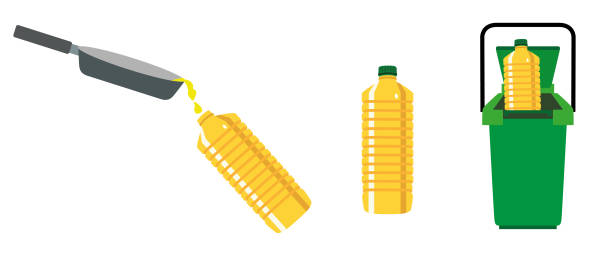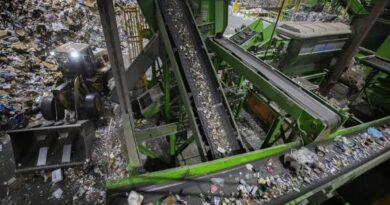Used Cooking Oil Recycling Process: Complete Guide
So many questions come to mind when thinking about used cooking oil recycling, but first, do you have a lot of used cooking oil, and it turns out that you don’t know what to do with it? or are you planning to use the same oil as the former you used to cook earlier, and it turns out that the oil needs to be recycled? or are you having a lot of oil that is not cooking oil, but can also be recycled?
Well! In this article, I will discuss with you the complete guide involving the process of recycling cooking oil, and the types of oil that can be recycled. Stay tuned and read to the end!
Cooking oil is known as a valuable resource that should be recycled whenever possible. When you cook with oil, it becomes contaminated with food particles, spices, and other materials. If this oil is not recycled, it will eventually end up in a landfill, where it will take many years to decompose.
However, if you recycle cooking oil, it can be used to produce biodiesel fuel, which can be used to power vehicles or heating systems.
Recycling cooking oil is a simple way to help preserve our environment and reduce our dependence on fossil fuels and you can simply get started with cooking oil recycling by locating and visiting any used cooking oil recycling near me/you, or search for used cooking oil recycling companies near me/you to discover the ones closer to your location.
But first, let’s talk about types of cooking oil that can be recycled.
Read Also: Plastic Bag Recycling Process Complete Guide
Types of Cooking Oils That Can Be Recycled

In the oil recycling industry, different types of oil can be recycled, which you can be able to use again.
Among these types of oil include the following, and if you are the type that has any of these oils, don’t throw them away in landfills anymore, because they won’t decompose and they will eventually affect our environment.
So, these are the major types of cooking oil that can be recycled:
- Canola oil
- Olive oil
- Soybean oil
- Corn oil
- Peanut oil
- Sunflower oil
- Lard
- Sesame oil
- Vegetable oil and more.
However, after knowing the types of oil that can be recycled, the importance of recycling them, and what they can be used for. Let’s talk about the complete process of recycling these oils.
Cooking Oil Recycling Process: Complete Beginning Guide

In the section, we will discuss the complete step-by-step process, which is the complete beginner’s guide of recycling cooking oil.
Here you will learn about: how to collect the oils and also the process involved in recycling this oil.
So, let’s get started:
1. Collect the used oil
The first step involved in the cooking oil recycling process is to collect the used oils.
Without this step, there will be no oil to be recycled. Probably, you are having some oil at home, or some neighbour of yours wants to dispose it in a landfill, it will be nice if you collect this oil from them, and also from others who don’t know what to do with their oil.
Since cooking oil can be recycled into new cooking oil, or it can be used to make biodiesel fuel( Biodiesel fuel is known as a clean-burning, renewable fuel that can be used in diesel engines).
However, before you can recycle, the used cooking oil must be collected in quantity and stored in a clean container, for it to be recycled.
Read Also: Camel toe pictures: what does camel toe mean and how to prevent camel toe
2. Filter the oil
You have collected the oil from different places and gathered it in a can. The next step that is involved in recycling used cooking oil is to filter the oil and remove all food particles or debris from it.
At this stage, the use of filters or strainers will be needed to filter the oil, because if the oil is filtered as required the recycling process is not yet completely done because even after recycling the oil without filtering, there will still be a need for you to do so.
So, the filtering stage of the recycling process is as important as the collection stage of cooking oil.
3. Recycle the oil
Thus, this is the last stage of cooking oil recycling, and also, at this stage, there are different methods companies use when it comes to cooking oil recycling.
However, some oil needs to be heated before filtering, while some don’t but as regards the second stage, the oil should be heated to a high temperature to destroy any bacteria or pathogens that may be present.
Once the oil has been heated, it is poured into a container and left to cool.
But if you are the type that wants to reuse your oil to cook, once the oil has cooled off after filtering, it can be used for cooking or frying.
Moreover, cooking oil can also be used as other products such as biodiesel as mentioned earlier, and to use it as biodiesel, there are some other methods (by using some machines and so on) which cooking oil recycling agencies use to make these products.
Read Also: Copper Recycling: The Benefits and Reasons To Recycle Copper
In conclusion, I hope this article has given you a great insight into how cooking oils can be recycled, the types of oil that can be recycled and the methods involved.
However, If you find this article grateful please leave a comment for us, and also don’t forget to share this article with others you feel can benefit from this information as we may not be able to reach everyone at the same time. Thank you so much for reading and sharing!



It’s good to know about used oil recycling and how it starts by collecting the said material by saving ones from home or getting them from your community. It would be nice to think about companies starting this endeavor as well. if they start collecting and recycling this material in bulk, it would create such a positive environmental and economic impact.
Thank you so much and glad you find the article useful
It sure was interesting when you said that recycled oil could be used in the biodiesel industry and power heating systems. This made me think of restaurants and other establishments that deal with used oil and grease. I could imagine how they could hire a grease recycling company to ensure a renewable option and save the environment.
Thank you so much and glad you find the article useful
We found it interesting when you described how we’d recycle our cooking oil at home. My wife and I want to learn how to recycle our trash and reduce our waste impact, so we think your article will be very useful for us. We’re grateful for the insight on how cooking oil could be used for cooking or biodiesel.
Thank you so much and glad you find the article useful
It’s great that you elaborated on as a precious resource, used cooking oil need to be recycled wherever feasible. My husband wants us to use and recycle waste oil properly that’s why I’m glad that I come across your article. Thank you for the information about the Cooking Oil Recycling Process, I’ll make sure to follow your useful tips, thanks!
Thank you so much and glad you find the article useful
Your statement that recycled oil may be used to make biodiesel and run heating systems was very intriguing. This brought to mind restaurants and other businesses that handle used oil and grease. I could see how they would work with Waste Oil Management service to provide a green alternative and protect the environment.
Thank you so much and we are glad that you find our article very helpful